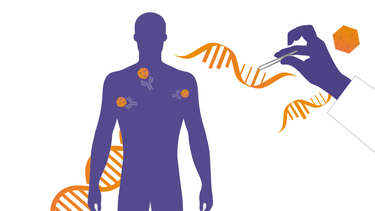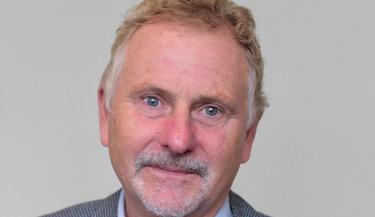A concerted collaboration to advance treatment options for people living with rare diseases
Collaboration among stakeholders is fundamental for the successful development of innovative treatments. This is especially important in rare diseases, where currently less than 10% have an approved treatment option (1,2), and there remains an urgent need to bring innovation in the treatment of rare diseases.
At Hansa Biopharma, we are committed to advance the science of rare immunologic diseases to help develop new treatments that can address these complex, progressive, and often fatal conditions. To achieve this, we work with key stakeholders – including patient advocacy groups, clinicians, payers, other industry players, and policy makers – to increase the understanding of rare diseases and advance the science around these conditions, to ultimately bring innovative treatment solutions to all patients who need them.
The urgent need in rare diseases
Rare diseases place a significant burden on patients and those who live with them, as well as on the entire healthcare system. There is a need for better and dedicated treatment options for rare diseases that can improve the quality of patients’ lives and reduce the impact on healthcare systems. Between 260 to 450 million people globally live with a rare disease.3 Approximately 50% of rare diseases affect children, with one in three dying before five years of age.4 The higher medical needs of people living with a rare disease means that they often miss work or are forced to early retirement, and may require the assistance of a caregiver.5
People living with rare diseases face unique challenges due to the rare nature of the disease which can result in incorrect or missed diagnoses, inadequate clinical management, and limited access to effective treatment.6,7
Delays and misdiagnosis can cause the disease to progress unchecked and worsen patients’ quality of life. This is particularly dangerous in rare acute diseases, including autoimmune conditions, where acting quickly can be lifesaving.
Guillain-Barré Syndrome (GBS), for example, is a severe acute autoimmune disease targeting peripheral nerves and their spinal roots that can lead to severe paralysis of the arms and legs with approximately 25% of patients requiring mechanical ventilation for days to months and 20% unable to walk after six months.8,9 The rare nature of the disease causes delays in diagnosis and in the subsequent start of immunosuppressive treatments that can help limit the long-term damage to the nerves.
Guided by patients’ voice
People living with rare diseases are keen to play an active role in the clinical development of innovative treatments, with the large majority open to consider using an investigational treatment.10 At Hansa, we collaborate with patients to ensure patients’ view and preferences are embedded in our strategy. Understanding and incorporating patients’ voice throughout the development of a treatment involves a decision-making process informed by patients’ views and insights. From early research and clinical trial design to regulatory evaluation and reimbursement, patients’ voices and their insights can help build a more comprehensive understanding of the value they see in accessing an innovative therapy. This understanding, combined with clinical input from treating physicians, can help assess the real impact an innovative therapy has on a patient’s life.11,12
"At Hansa, we work to ensure that the patient voice is heard and understood during clinical decision-making regarding their priorities and needs and in reimbursement access decisions" said Gina Ewy VP of Global Market Access at Hansa Biopharma. "As an example, we are working closely with the American Association of Kidney Patients (AAKP) to conduct a discrete choice study investigating the factors highly sensitized kidney transplant patients most value when making a therapeutic choice to remain on dialysis or proceed with an HLA-incompatible kidney transplant surgery."
Advancing our understanding of rare diseases
As we focus on developing treatment options in conditions where Hansa’s technology may help bring meaningful benefit to people living with rare diseases, we see strong value in collaborating with researchers and institutions at the forefront of scientific advancement through investigator-initiated studies. By advancing the knowledge on rare diseases, we can reach a better understanding of the potential added value of our therapies in different therapeutic areas.
In anti-glomerular basement membrane (anti-GBM) disease, an acute and very severe inflammatory disease, an open-label Phase 2 investigator-initiated study (GOOD-IDES-01) led by Professor Mårten Segelmark at Linköping University highlighted new key insights on the correlation between the inactivation of IgG autoantibodies in patients experiencing an acute autoimmune attack and the improved outcomes and kidney function.13 Hansa Biopharma is now following up on the encouraging evidence with an ongoing pivotal Phase 3 trial (GOOD-IDES-02).
"Our collaboration with Mårten Segelmark and all the participating investigators on GOOD-IDES-01 was instrumental to understand how we could bring added benefit to treatment strategies" said Elisabeth Sonesson, Global Franchise Lead, Autoimmune, Hansa Biopharma. "Now, our phase 3 trial GOOD-IDES-02 is the first and currently only pivotal randomized trial in anti-GBM disease, remarking the need to bring innovation in the treatment of this debilitating disease."
Similarly, Hansa’s first-generation enzyme is now being investigated in an investigator-initiated phase 2 study in anti-neutrophil cytoplasmic antibody (ANCA)-associated vasculitis, a group of conditions with a high unmet need, where one in four patients progresses to end stage kidney disease and respiratory failure in worst cases.14,15
Bringing new opportunities to more patients
By teaming up with other industry players focusing on bringing new treatment options to patients, we can contribute to the evolving field of rare disease therapies, as the opportunities for treatment access also evolve.
For people living with rare, monogenic diseases, gene therapies may offer a cure to a life-long condition by introducing genetic material that compensates for a defective gene. However, for therapies based on the use of modified Adeno Associated Viruses (AAV) vectors, a challenge is posed by the presence of pre-formed antibodies targeting the AAV vectors and currently prevent up to 1 in 3 people from benefiting from these treatments.16-20
We are frequently exposed to wild-type AAVs as they are the cause of many common infections. Many people, therefore, develop antibodies following a viral infection with AAVs, and these antibodies become part of their immune response. If the person then receives a gene therapy based on the same type of AAV vector, the anti-AAV antibodies trigger an immune response against the viral vectors that prevents the gene therapy to enter the body cells and deliver the genetic material.
Addressing barriers to gene therapy treatment
How immunomodulating therapies can help more people access innovative gene therapy treatments.

Sarepta Therapeutics is partnering with Hansa Biopharma on preclinical and clinical programs to advance the use Hansa’s enzyme as a pre-treatment to their gene therapies in Duchenne Muscular Dystrophy and in Limb-Girdle Muscular Dystrophy. The combination of the gene therapy and Hansa’s enzymes can expand access to Sarepta’s treatments to patients carrying anti-AAV antibodies.
Similarly, in the spring of 2023, Hansa formed a partnership with Généthon, a leading gene therapy research non-profit organization. Hansa and Généthon are conducting a study to enable gene therapy treatment in patients with Crigler-Najjar syndrome and pre-formed antibodies towards the AAV-based gene therapy. Crigler-Najjar syndrome is a genetic disease leading to bilirubin accumulation in the body and subsequent organ damage.
"There are growing opportunities for industry players to work together and advance the science and understanding of rare disease treatments. Our primary focus is patients, and our priority is ensuring we can enable all patients, including those with anti-AAV antibodies, to receive innovative treatments" said Lena Winstedt, Global Franchise Lead, Gene Therapy, Hansa Biopharma.
Ensuring access to innovation for all those in need
At Hansa we aspire to be a leader in treating rare immunologic diseases by delivering lifesaving and life-altering medicines to people with high medical unmet need. We take a multi-pronged approach to ensuring we work together with a constellation of stakeholders – patients, clinicians, industry players and more – to create new opportunities for people living with rare diseases, faster.
We know that delivering innovative treatments is not enough. We must collaborate with a spectrum of stakeholders including clinical, research, payer and patient community members to quickly discover, develop and make innovative new medicines available.
References
- National Organization for Rare Disorders – https://rarediseases.org/understanding-rare-disease/rare-disease-facts-and-statistics/
- Fermaglich LJ, Miller KL. A comprehensive study of the rare diseases and conditions targeted by orphan drug designations and approvals over the forty years of the Orphan Drug Act. Orphanet J Rare Dis. 2023 Jun 23;18(1):163. Doi: 10.1186/s13023-023-02790-7.
- Nguengang Wakap, S., Lambert, D.M., Olry, A. et al. Estimating cumulative point prevalence of rare diseases: analysis of the Orphanet database. Eur J Hum Genet 28, 165–173 (2020). https://doi.org/10.1038/s41431-019-0508-0
- Spotlight on rare diseases. Thelancet.com/diabetes-endocrinology Vol 7 February 2019 https://www.thelancet.com/pdfs/journals/landia/PIIS2213-8587(19)30006-3.pdf. Accesses: June 2024.
- Every Life Foundation for Rare Diseaseshttps://everylifefoundation.org/wp-content/uploads/2021/02/The_National_Economic_Burden_of_Rare_Disease_Study_Summary_Report_February_2021.pdf. Accesses: June 2024.
- Rare Disease International. Available at: https://www.rarediseasesinternational.org/wp-content/uploads/2022/08/INFOGRAPHIC-OPERATIONAL-DESCRIPTION-OF-RARE-DISEASES.pdf. Accesses: June 2024.
- Willmen T,et al. Rare diseases: why is a rapid referral to an expert center so important? BMC Health Serv Res. 2023 Aug 23;23(1):904.
- Van Doorn PA. Diagnosis, treatment and prognosis of Guillain-Barré syndrome (GBS). Presse Med. 2013 Jun;42(6 Pt 2):e193-201.
- Au HKE, et al. (2022) Gene Therapy Advances: A Meta-Analysis of AAV Usage in Clinical Settings. Front. Med. 8:809118.
- NORD. Barriers To Rare Disease Diagnosis, Care and Treatment in the US: A 30-Year Comparative Analysis. Available at: https://rarediseases.org/wp-content/uploads/2020/11/NRD-2088-Barriers-30-Yr-Survey-Report_FNL-2.pdf. Accessed June 2024.
- Rapid response to: “Reforming EU and national orphan drug regulations to improve outcomes for patients with rare diseases”- BMJ 2023;381:e072796
- ISPOR. https://www.ispor.org/publications/journals/value-outcomes-spotlight/vos-archives/issue/view/addressing-assessment-and-access-issues-for-rare-diseases/addressing-assessment-and-access-issues-for-rare-diseases. Accessed June 2024.
- Uhlin F, et al. Endopeptidase Cleavage of Anti-Glomerular Basement Membrane Antibodies in vivo in Severe Kidney Disease: An Open-Label Phase 2a Study. J Am Soc Nephrol. 2022 Apr;33(4):829-838. Doi: 10.1681/ASN.2021111460.
- Booth AD, et al. Outcome of ANCA-associated renal vasculitis: a 5-year retrospective study. Am J Kidney Dis. 2003 Apr;41(4):776-84. doi: 10.1016/s0272-6386(03)00025-8. PMID: 12666064.
- Flossmann O, et al. European Vasculitis Study Group. Long-term patient survival in ANCA-associated vasculitis. Ann Rheum Dis. 2011 Mar;70(3):488-94. doi: 10.1136/ard.2010.137778. Epub 2010 Nov 24. PMID: 21109517.
- Boutin S, et al. Prevalence of serum IgG and neutralizing factors against adeno-associated virus (AAV) types 1, 2, 5, 6, 8, and 9 in the healthy population: implications for gene therapy using AAV vectors. Hum Gene Ther. 2010 Jun;21(6):704-12.
- Calcedo R, Wilson JM. Humoral Immune Response to AAV. Front Immunol. 2013 Oct 18;4:341. doi: 10.3389/fimmu.2013.00341. PMID: 24151496; PMCID: PMC3799231.
- Veron P, et al. Humoral and cellular capsid-specific immune responses to adeno-associated virus type 1 in randomized healthy donors. J Immunol. 2012 Jun 15;188(12):6418-24. doi: 10.4049/jimmunol.1200620. Epub 2012 May 16. PMID: 22593612.
- Kruzik A, et al. Prevalence of Anti-Adeno-Associated Virus Immune Responses in International Cohorts of Healthy Donors. Mol Ther Methods Clin Dev. 2019 Jun 7;14:126-133. doi: 10.1016/j.omtm.2019.05.014. PMID: 31338384; PMCID: PMC6629972.
- Leborgne C, et al. IgG-cleaving endopeptidase enables in vivo gene therapy in the presence of anti-AAV neutralizing antibodies. Nat Med. 2020 Jul;26(7):1096-1101.
